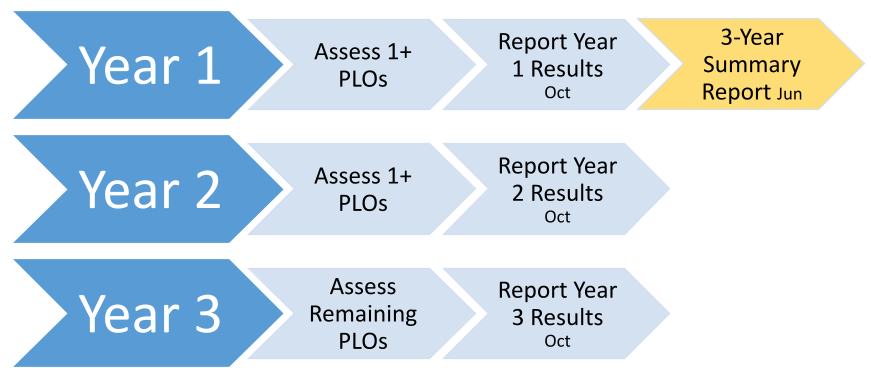Frequently Asked Questions on Assessment at University of Maine:
Assessment:
“Assessment”, in this context, is a short-hand term for Learning Outcomes Assessment. It is the process for gathering information about the degree to which students are meeting stated learning outcomes and using that information to make meaningful curricular changes so that continuous improvement of our academic programs takes place. In short, it is a way to make the process of curricular improvement evidence-based and transparent to all stakeholders.
There are external and internal (to the university) reasons for having an assessment process in place. External reasons include the need to show our accrediting agencies that we are providing educational opportunities for our students that result in meaningful learning. Internal reasons include having a systematic, evidence-based and transparent process in place to support the continual improvement of our curricula.
Assessment is a type of action research with the “primary goal of improving practice rather than generating theoretical knowledge” (Banta & Palomba, 2015).
For an exact description of the assessment reporting process please see the University of Maine Assessment Plan and the UMaine Assessment Reporting Handbook, both available here. In short, every department must show yearly evidence of measuring one or more of their stated program learning outcomes. Over the course of a three year assessment cycle all of a program’s learning outcomes must be measured. Measurement of learning outcomes must be followed by reflection on the results and planning for how to improve the curriculum, with respect to each learning outcome, should results warrant.
The only required dates related to assessment reporting are an Oct 31 due date for annual assessment data (any data collected the previous academic year) and a June 30 due date for 3-Year Assessment Summary reports (every 3rd year, when your program is due). Starting for programs in the third year of their assessment cycle in 2025-26, we have moved the due date of the 3-Year Summary Report to a year later (a year after the third year of your cycle ends). This means that 3-Year Summary Reports will be due at the end of the first year of your new cycle. This gives programs an extra year to reflect on results from the previous 3-years of data collection.

The Toolkit & Resources page provides easy access to UMaine standardized documents for use with the assessment planning process. Reporting uses standardized forms and spreadsheets, which can be found on the Annual Assessment Reporting and 3-Year Assessment Reporting pages.
Contact Ryan Weatherbee (ryan.a.weatherbee@maine.edu – undergrad) or Laura Millay (laura.millay@maine.edu – grad) and we will talk you through it!
Reporting:
Every year, programs are expected to complete annual assessment reports showing the evidence collected for one or more learning outcomes. These annual reports should include: the outcome(s) assessed, evidence and alignment, a brief description of the process used to assess students, results and reflection, as well as recommendations for future planning.
Every third year, programs will submit a 3-year report alongside the annual report that reflects on their assessment process and the successes and/or challenges associated with any changes made to address issues identified in earlier assessment rounds. The curriculum map should also be included in the 3-year report.
All program learning outcomes (PLOs) should be assessed within a 3-year cycle, although not all need to be assessed every year. For more detailed information on both of these reports, please see the UMaine Assessment Reporting Handbook.
Annual Reporting
Annual assessment data (any data collected the previous academic year, and due by Oct 31) should be uploaded via the Annual Assessment Reporting portals (there are separate ones for undergrad and grad programs).
3-Year Reporting
3-Year Assessment Summary reports (due every 3rd year, by June 30 – find your cohort in Appendix A in the UMaine Assessment Plan) are submitted in a program specific Google Spreadsheet which can be found linked from the Assessment Reporting page. When your program is due to submit their 3-Year Assessment Summary Report, it should be based on annual data from the previous three academic years (which should already have been submitted). Therefore, there is an extra year to prepare the 3-Year Assessment Summary report after a 3-year assessment cycle ends.
All program learning outcomes (PLOs) should be assessed within a 3-year cycle, although not all need to be assessed every year. For more detailed information on both of these reports, please see the UMaine Undergraduate Assessment Reporting Handbook or UMaine Graduate Assessment Reporting Handbook.
Assessment Toolkit:
We have a dedicated workshop on how to develop meaningful, manageable and measurable learning outcomes. More information is available here.
Curriculum mapping is the process of graphically describing where each program learning outcome is being covered throughout the curriculum of a program so that the scope and sequence of learning can be visualized. This allows potential gaps, sequencing issues and redundancies in the curriculum to be identified. The map typically takes the form of a spreadsheet where the courses in a program are listed along the columns and the program learning outcomes are listed along the rows (note – rows and columns can be transposed). Within each cell, where a program outcome and a course intersect, a symbol representing whether, and to what degree, a program outcome is being met is indicated. In some cases the symbol may just be a ‘x’ and in others it may be something like I, B, or M to represent Introduction, Building and Mastery of an outcome. For more information see our online workshop on curriculum mapping.
Responsibilities:
The office at UMaine responsible for coordination of program level outcomes assessment is the Office of Institutional Research and Assessment. The Assistant Provost for Institutional Research and Assessment is Dr. Deb Allen. Ryan Weatherbee is the Assistant Director for Assessment (main contact for undergrad assessment) and Laura Millay is the Assessment and Institutional Research Analyst (main contact for graduate assessment).
- Deb Allen (debra.allen@maine.edu)
- Ryan Weatherbee (ryan.a.weatherbee@maine.edu)
- Laura Millay (laura.millay@maine.edu)
References:
Banta, T.W. and C.A. Palomba (2015). Assessment Essentials (2nd ed.). Jossey-Bass.
